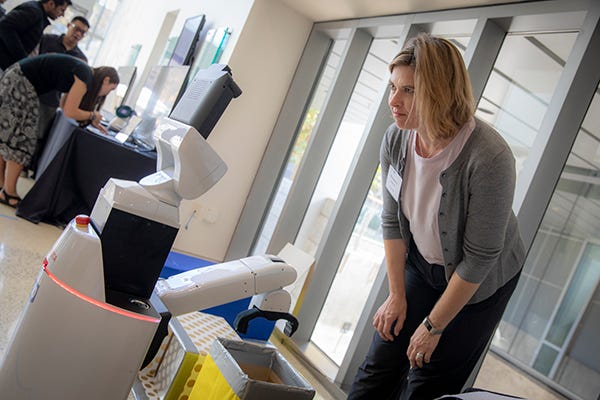Introduction
The rise of Artificial Intelligence (AI) has been nothing short of revolutionary, impacting industries and reshaping the workforce as we know it. AI technologies, such as machine learning and automation, have the potential to perform tasks once solely in the domain of humans. In this article, we will explore the jobs that AI is set to replace by 2020, highlighting the need for adaptation, reskilling, and the emergence of new roles in the evolving job landscape.
1. Data Entry Clerks
Data entry clerks have long been responsible for manually inputting data into computer systems. However, AI-powered software and Optical Character Recognition (OCR) technology can process and input data faster and more accurately than humans. As a result, jobs primarily focused on data entry are at risk of being automated.
2. Telemarketers
Telemarketing is a field that heavily relies on repetitive tasks involving scripted phone calls. AI-driven chatbots and virtual assistants are increasingly being used to automate customer interactions and handle routine inquiries, reducing the need for human telemarketers.
3. Cashiers
With the advent of self-checkout kiosks in retail stores and automated payment systems in restaurants, the role of cashiers is diminishing. AI-driven systems can handle payment processing and order taking efficiently, reducing the demand for human cashiers.
4. Assembly Line Workers
In manufacturing, AI-powered robots are becoming increasingly prevalent. These robots are capable of performing repetitive assembly tasks with precision and speed, eliminating the need for human assembly line workers in some industries.
5. Bookkeepers and Accountants
The field of accounting involves data analysis and calculations, which are tasks that AI excels at. AI-powered accounting software can automate bookkeeping tasks, such as data entry and reconciliation, reducing the need for human accountants for routine tasks.
6. Customer Service Representatives
AI-powered chatbots and virtual assistants are increasingly being employed in customer service roles. They can handle customer inquiries, troubleshoot issues, and provide information 24/7, reducing the demand for human customer service representatives for routine queries.
7. Data Analysts
While AI may not replace data analysts entirely, it can significantly augment their capabilities. AI tools can process and analyze vast amounts of data quickly, enabling data analysts to focus on more complex and strategic aspects of their work.
8. Delivery Drivers
The development of autonomous vehicles and drones is set to transform the delivery industry. While this transformation may not be fully realized by 2020, it poses a potential threat to the jobs of human delivery drivers in the near future.
9. Retail Sales Associates
AI-driven recommendation systems and virtual shopping assistants are changing the way customers shop. These systems can provide personalized product recommendations and answer customer queries, reducing the need for human retail sales associates.
10. Routine Healthcare Workers
In healthcare, AI is making inroads into routine tasks, such as medical data entry, radiology image analysis, and administrative duties. While AI may not replace healthcare professionals, it can alleviate some of their workload, allowing them to focus on more critical aspects of patient care.
The Impact of AI on the Job Market

The integration of AI into the workforce raises important questions about the impact on employment. While AI is set to replace certain jobs, it is also creating new opportunities in emerging fields, such as AI development, data science, and robotics maintenance. Moreover, AI can enhance productivity and efficiency across industries, potentially leading to the creation of new roles that we can’t predict with certainty.
Preparing for the Workforce of Tomorrow
As the job landscape evolves, it is crucial for individuals and society to adapt and prepare for the workforce of tomorrow. Here are some steps to consider:
1. Lifelong Learning
Embrace a mindset of lifelong learning. Continuously update your skills and knowledge to stay relevant in a changing job market. Consider pursuing certifications and online courses in emerging fields.
2. Soft Skills
Focus on developing soft skills that are less likely to be automated, such as critical thinking, creativity, adaptability, and emotional intelligence. These skills will become increasingly valuable in the job market.
3. Embrace Technology
Become tech-savvy and comfortable with AI and automation tools. Understanding how to work alongside AI systems can make you a more valuable asset to your organization.
4. Specialization
Consider specializing in a niche area where human expertise remains essential. This could involve fields like ethics in AI, AI safety, or AI implementation and management.
5. Entrepreneurship
Explore entrepreneurial opportunities, including creating your own AI-driven products or services. Entrepreneurship can provide greater control over your career in an evolving job market.
6. Government and Policy Involvement
Advocate for responsible AI adoption and engage in discussions about workforce development and job displacement. Governments and policymakers will play a crucial role in shaping the future of work.
Conclusion
The rise of AI and automation presents both challenges and opportunities for the workforce. While some jobs are at risk of being replaced by AI by 2020, new roles are emerging, and the demand for certain skills is increasing. Preparing for the workforce of tomorrow involves a commitment to continuous learning, adaptability, and a willingness to embrace technology. By staying informed and proactive, individuals can navigate the changing job landscape and thrive in a world where AI is an integral part of the workforce.

